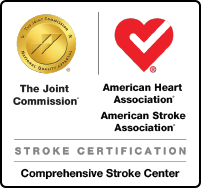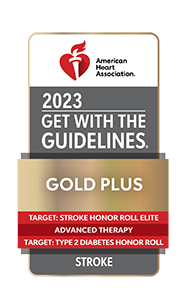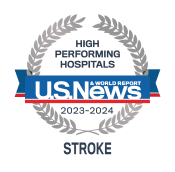Ischemic Stroke
Ischemic stroke, the most common type of stroke, occurs when the blood flow in a vein or artery in the brain is blocked or reduced.
It can result from:
- A blood clot that forms in another part the body
- A piece of plaque, fatty material that clogs the arteries, breaks loose into the bloodstream and forms a blood clot
- Plaque buildup, called atherosclerosis, that narrows the arteries (stenosis) and reduces blood flow to the brain
The main types of ischemic stroke are:
Thrombotic Stroke
This results from a blood clot, or thrombus, that forms inside an artery supplying blood to the brain. People with high cholesterol levels and atherosclerosis (hardening of the arteries) are at higher risk for this type of stroke.
Embolic Stroke
This occurs when a blood clot or embolus travels from anywhere in the body to the brain and blocks a blood vessel. Atrial fibrillation is a stroke risk factor for embolic strokes.
Ischemic Stroke Symptoms
As in hemorrhagic stroke, ischemic stroke symptoms happen suddenly. The acronym 'BE FAST' can help you remember the signs of a stroke:
- Balance – Ask if the person feels dizzy or has trouble standing.
- Eyes – Ask if the person has blurred or double vision.
- Face – Ask the person to smile and see if one side of the face droops.
- Arms – Ask the person to raise both arms and see if one arm drifts downward.
- Speech – Ask the person to repeat a simple phrase like, “The sky is blue,” and note whether it’s correct or speech is confused, slurred or garbled.
- Time – Call 911 immediately if the person has any or several of these symptoms. Time lost is brain lost.
Call 911 immediately if you or anyone around you has one or more of these symptoms. Stroke treatment must occur as quickly as possible to improve the chances of a good outcome.
Ischemic Stroke Diagnosis
Diagnosing the type and location of the stroke as soon as possible is critical to ensure the best treatment and outcome. Stroke specialists at University of Maryland Comprehensive Stroke Center use advanced imaging such as CT (computed tomography) scan or MRI (magnetic resonance imaging) to diagnose stroke.
Ischemic Stroke Treatment
The University of Maryland's stroke specialists treat ischemic stroke with medication and minimally invasive procedures.
Clot-Busting Medication
Depending on their condition, patients may receive the clot-busting medication Alteplase. For the best outcome, patients must receive Alteplase within 4.5 hours of the stroke occurrence.
Mechanical Thrombectomy
Combined with Alteplase for eligible patients, this minimally invasive catheter procedure uses a small wire to break blood clots in the brain. Although this is most effective within 6 hours of stroke onset, in some cases it can be effective within 24 hours of onset.
Stroke Recovery
At the University of Maryland Rehabilitation & Orthopaedic Institute, we work with you and your family to focus on ability, not disability. We also help you focus on reducing your risk factors to prevent another stroke.
The rehabilitation care team works together to develop a care plan to help the patient recover. Care team members include rehabilitation doctors, nurses, speech therapist, occupational therapists, physical therapist and more.
Schedule an Appointment
If you or a loved need an appointment with a stroke specialist, call 410-328-4323 to make an appointment at the UM Neurology Care Center.



